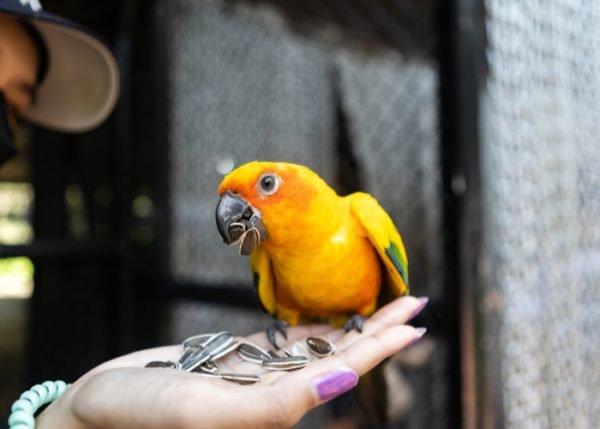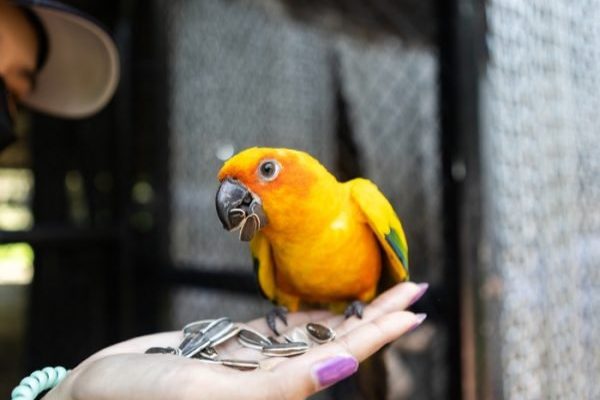
So let’s grab a cup of coffee and chat about what it takes to be a great conure parent. Whether you’re considering adopting a sun conure or a green-cheeked conure, understanding the basics can help you build a strong bond with your feathered friend. From what goes in their bowl to the perfect cage setup and their craving for companionship, there’s so much to cover. Ready? Let’s do this!
The Right Diet: What Conures Should Eat
When it comes to a conure’s diet, think of it as a buffet filled with colorful and varied dishes. Conures are omnivores, which means they enjoy a mix of fruits, vegetables, seeds, and pellets. Here’s the thing: not all foods are created equal, and some are better than others for your feathery friend.
Pellets should be the cornerstone of a conure’s diet. Look for high-quality brands that list natural ingredients. You’ll want to avoid those seed-based diets that are high in fat and low in nutrition. Instead, choose pellets that provide balanced vitamins and minerals.
Next up are fruits and vegetables. Conures love colorful produce such as carrots, leafy greens, apples, and berries. Just remember to wash everything thoroughly and chop it into manageable pieces—think bite-sized treats. It’s a great idea to mix things up regularly, keeping it interesting for your conure and ensuring they get a variety of nutrients.
Don’t forget to offer occasional seeds and nuts as treats but keep them minimal. These are high in fat, which can lead to obesity if overfed. You might be wondering about giving them human food. While it can be tempting, it’s best to stick to bird-safe options. Avoid anything salty, fatty, or sugary.
Choosing the Perfect Housing for Your Conure
A suitable cage is like a cozy home for your conure, a place where they can feel safe and secure. Think of it as their personal sanctuary. When selecting a cage, consider size first. Conures need space to flap their wings and play. A minimum cage size of 24″ x 24″ x 36″ will work, but bigger is always better!
Look for a cage with horizontal bars to help your conure climb and explore. Avoid cages made entirely of plastic—they can chew through it—and opt for a sturdy metal cage instead. Some conures can be quite the escape artists, so make sure the cage has secure locks.
Inside the cage, include perches of various widths and materials. This helps keep their feet healthy and gives them options for play. You can also add toys, like swings and chew toys, to keep them engaged. Rotate these toys regularly; they love new things to explore!
Lastly, think about where you place the cage. Conures are social and enjoy being part of the family. Ideally, position the cage in a lively room where they can interact with you. Just remember to avoid drafts and direct sunlight, as this can be harmful to their health.
Understanding Social Needs: The Social Butterflies
Here’s the thing about conures—they’re incredibly social creatures. If you were to compare them to people, they’d be the extroverts of the bird world! They thrive on interaction, whether it’s with other birds or their human companions. Leaving them alone for long periods can lead to loneliness and behavioral issues. So, how can you provide the social environment they crave?
First, consider companionship. Many conure owners choose to adopt more than one bird because they enjoy the company of their own kind. If you go this route, make sure the birds are compatible. Pairing different species can sometimes lead to conflicts.
If a second bird isn’t in your plans, you’ll need to step in as your conure’s buddy. Spend quality time with them every day—talking, playing, and even training. Yes, training! Teaching tricks can be a fun way to bond and mentally stimulate your bird.
Regular out-of-cage time is also crucial. Allow your conure to explore a safe space outside of their cage. Supervised playtime on a perch or a bird-safe play gym can be a great way for them to burn off energy. Just be sure to remove anything dangerous, like toxic plants or small items they could swallow.
Creating a Routine: The Key to Happy Conures
Just like us, conures thrive on routine. Establishing a daily schedule can help them feel secure and reduce stress. Start by sticking to regular feeding times, which helps them know when to expect meals. This can greatly improve their overall well-being.
Incorporate playtime into their routine too. Setting aside time each day for interaction, whether it’s training or letting them fly around, promotes a strong bond. Keep in mind that conures can get bored easily, so change up their toys and activities regularly to keep things fresh.
Cleaning their cage should also be part of the routine. Regularly remove uneaten food and waste to maintain a healthy environment. Use safe cleaning solutions to wipe down perches and toys. A clean space not only benefits your bird’s health but also encourages positive behavior.
Finally, remember that conures are creatures of habit. The more consistency you provide, the happier and healthier they’ll be. It’s like a loving embrace that helps them feel secure.
Common Health Concerns: Keeping Your Conure Healthy
Even with the best care, conures can face health issues, so it’s essential to be vigilant. Regular vet check-ups are a must. Many owners don’t realize that birds can hide their illnesses until it’s too late. So, truly observing your conure’s behavior can help catch any problems early.
Some common issues include respiratory infections, feather plucking, and digestive problems. You might notice changes in their droppings or a decrease in their energy level; these can be signs that something is amiss.
Also, be aware of their dietary needs. Overfeeding treats or offering the wrong foods can lead to obesity and health complications. Monitor their weight regularly and adjust their diet as necessary.
Creating a stress-free environment is also important for their health. Loud noises, sudden movements, or too much handling can cause anxiety. Make sure they have quiet time and a safe space to retreat when needed.
Welcoming a conure into your home can be one of the most rewarding experiences. Their vibrant personalities and social nature can bring laughter and joy to your life. Remember, providing the right care means a balanced diet, a safe and engaging living space, and plenty of social interaction.
As you embark on this journey, keep in mind that patience is key. Each bird has its own quirks and preferences. Take your time to understand your feathered friend, and you’ll have a loyal companion for many years to come. It’s all about the little moments, whether it’s a shared laugh over a silly dance, or simply enjoying their presence as they perch on your shoulder. Happy conure parenting!

